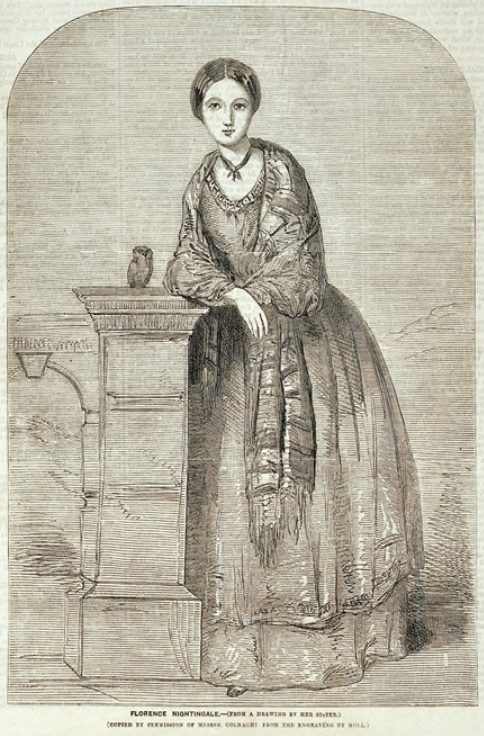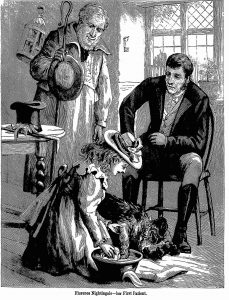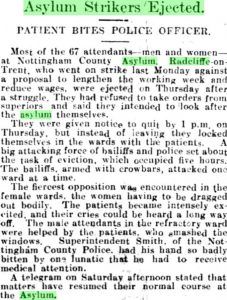
May 3, 2019, by ahxfc
‘ay up me ‘Nightingale’: Did you know that Florence Nightingale lived in Derbyshire?
Those that are familiar with the East Midlands are sure to have heard the local friendly greeting ‘ay up me duck’, but perhaps we should be swapping one avian for another and saying ‘ay up me Nightingale’ to commemorate this infamous nurse’s Derbyshire connections.
Dr Richard Bates and Frances Cadd, PhD, from the AHRC funded project ‘Florence Nightingale Comes Home for 2020’, were delighted to have the opportunity to talk about the founder of modern nursing’s little-known East Midlands connections at History Festival 2019, held by the University of Nottingham on 10 April 2019.
The festival was a public event which brought together all history enthusiasts, whether they be staff, students or members of the wider community, for an enthralling day of history themed interactive workshops for knowledge sharing and development.‘Nurses and Nightingales’ was amongst a diverse array of workshops on history across the world and centuries. The session introduced the ‘Florence Nightingale Comes Home for 2020’ interdisciplinary research project, which investigates the influences of Nightingale’s Derbyshire connections on her professional and literary life through historico-literary analysis.

‘Florence Nightingale – Her First Patient’, Chatterbox, C.1860. Nightingale depicted as a child at her family’s country home, Lea Hurst, in Matlock, Derbyshire, bandaging an injured local sheepdog.
However, that Nightingale was a local seems to be largely unknown to the regional community. The inquisitive audience discovered that the Nightingale’s were a Derbyshire family who kept a holiday home, Lea Hurst, in the village of Lea in Matlock. Florence spent much of her childhood at Lea Hurst. It was also the site from which she left to nurse in the Crimean War in 1854 and that which she returned to in 1856.
Dr Bates led a ‘myth busting quiz’ which aimed to separate some of the facts from the fiction that surrounds Nightingale’s legacy and image, both in her personal convictions and in her professional achievements. For example, did you know that Nightingale was an exceptionally good statistician? She developed her own polar area graphs to reflect the death rate in Crimea at a time when statistics was a new field. In addition, contrary to popular belief, Nightingale was in favour of the movement for women’s suffrage but did not actively support the campaign. She believed suffrage for women was not something that could be achieved in her lifetime – which turned out to be correct! Instead, she chose to channel her energies and efforts into economic rights for women believing these were more obtainable in the political and social milieu of nineteenth-century Britain.

‘Asylum Strikers Ejected’, Gloucester Journal, 22 April 1922. A newspaper article describing one of the first ever nursing strikes in British history. In 1922, male and female nurses at Radcliffe Asylum, Nottingham, protested their reduced pay and longer working hours. Nearly all were dismissed and replaced.
After some successful myth busting Frances then explored some of the stereotypes of nurses and nursing with the group. An insightful discussion pursued around the question: ‘what is a nurse?’, which revealed many of the persistent assumptions commonly held about nurses. The unrealistic portrayal of nurses as ‘ministering angels’ or ‘battle-axes’ was then interrogated by the group through a diverse range of primary sources which depict nurses and nursing from the nineteenth-century until the present day. A particularly salient debate emerged around the idea of nursing as a ‘vocation’ and how this impacts the expectations we have of nurses and the conditions under which they work. For example, were all nurses ‘born nurses’ or did some enter the work for economic benefits or social mobility? In addition, how far did the belief that a strong dedication and commitment to helping others would alone drive nurses to stay in the profession contribute to issues such as low pay or excessive working hours? Although these questions had a historical focus, the group found that they held much resonance today, appreciating how the past can be used to better understand dynamics and attitudes around contemporary nursing.
The conversations, debates and ideas that emerged from the workshop around the history and politics of nursing were immensely gratifying in that they provided much food for thought, for both future research and contemporary discussion around this invaluable profession.
We are looking forward to History Festival 2020 where we can hopefully build on these crucial questions with equal enthusiasm and success!
No comments yet, fill out a comment to be the first

Leave a Reply